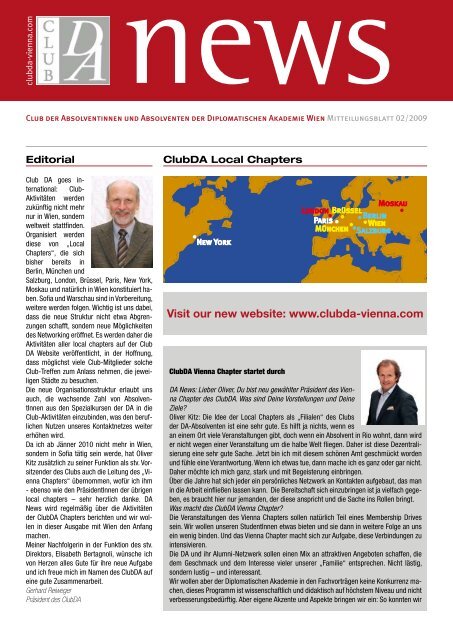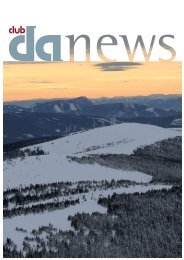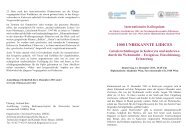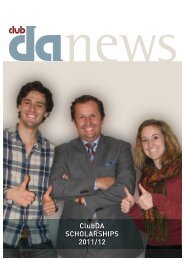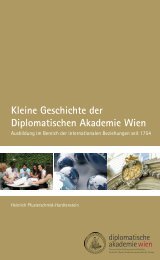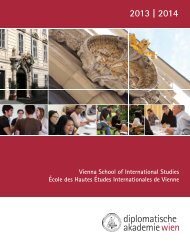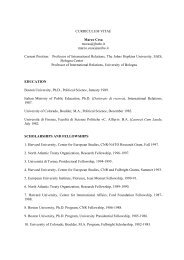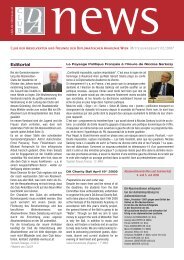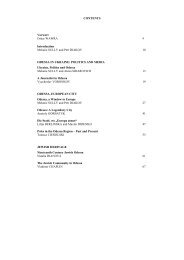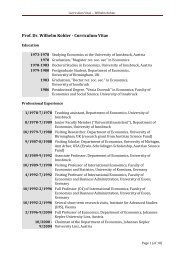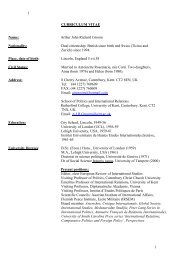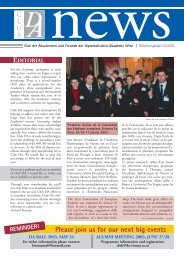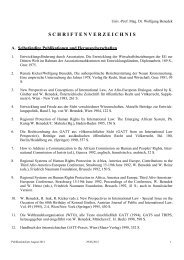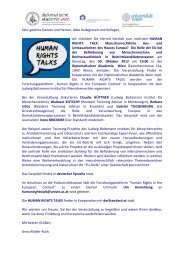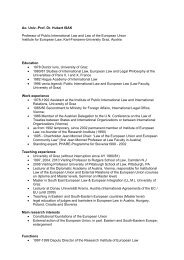Visit our new website: www.clubda-vienna.com - Diplomatic ...
Visit our new website: www.clubda-vienna.com - Diplomatic ...
Visit our new website: www.clubda-vienna.com - Diplomatic ...
Create successful ePaper yourself
Turn your PDF publications into a flip-book with our unique Google optimized e-Paper software.
<strong>clubda</strong>-<strong>vienna</strong>.<strong>com</strong><br />
<strong>new</strong>s<br />
Club der Absolventinnen und Absolventen der Diplomatischen Akademie Wien Mitteilungsblatt 02/2009<br />
Editorial<br />
Club DA goes international:<br />
Club-<br />
Aktivitäten werden<br />
zukünftig nicht mehr<br />
nur in Wien, sondern<br />
weltweit stattfinden.<br />
Organisiert werden<br />
diese von „Local<br />
Chapters“, die sich<br />
bisher bereits in<br />
Berlin, München und<br />
Salzburg, London, Brüssel, Paris, New York,<br />
Moskau und natürlich in Wien konstituiert haben.<br />
Sofia und Warschau sind in Vorbereitung,<br />
weitere werden folgen. Wichtig ist uns dabei,<br />
dass die neue Struktur nicht etwa Abgrenzungen<br />
schafft, sondern neue Möglichkeiten<br />
des Networking eröffnet. Es werden daher die<br />
Aktivitäten aller local chapters auf der Club<br />
DA Website veröffentlicht, in der Hoffnung,<br />
dass möglichst viele Club-Mitglieder solche<br />
Club-Treffen zum Anlass nehmen, die jeweiligen<br />
Städte zu besuchen.<br />
Die neue Organisationsstruktur erlaubt uns<br />
auch, die wachsende Zahl von AbsolventInnen<br />
aus den Spezialkursen der DA in die<br />
Club-Aktivitäten einzubinden, was den beruflichen<br />
Nutzen unseres Kontaktnetzes weiter<br />
erhöhen wird.<br />
Da ich ab Jänner 2010 nicht mehr in Wien,<br />
sondern in Sofia tätig sein werde, hat Oliver<br />
Kitz zusätzlich zu seiner Funktion als stv. Vorsitzender<br />
des Clubs auch die Leitung des „Vienna<br />
Chapters“ übernommen, wofür ich ihm<br />
- ebenso wie den PräsidentInnen der übrigen<br />
local chapters – sehr herzlich danke. DA<br />
News wird regelmäßig über die Aktivitäten<br />
der ClubDA Chapters berichten und wir wollen<br />
in dieser Ausgabe mit Wien den Anfang<br />
machen.<br />
Meiner Nachfolgerin in der Funktion des stv.<br />
Direktors, Elisabeth Bertagnoli, wünsche ich<br />
von Herzen alles Gute für ihre neue Aufgabe<br />
und ich freue mich im Namen des ClubDA auf<br />
eine gute Zusammenarbeit.<br />
Gerhard Reiweger<br />
Präsident des ClubDA<br />
ClubDA Local Chapters<br />
<strong>Visit</strong> <strong>our</strong> <strong>new</strong> <strong>website</strong>: <strong>www</strong>.<strong>clubda</strong>-<strong>vienna</strong>.<strong>com</strong><br />
ClubDA Vienna Chapter startet durch<br />
DA News: Lieber Oliver, Du bist neu gewählter Präsident des Vienna<br />
Chapter des ClubDA. Was sind Deine Vorstellungen und Deine<br />
Ziele?<br />
Oliver Kitz: Die Idee der Local Chapters als „Filialen“ des Clubs<br />
der DA-Absolventen ist eine sehr gute. Es hilft ja nichts, wenn es<br />
an einem Ort viele Veranstaltungen gibt, doch wenn ein Absolvent in Rio wohnt, dann wird<br />
er nicht wegen einer Veranstaltung um die halbe Welt fliegen. Daher ist diese Dezentralisierung<br />
eine sehr gute Sache. Jetzt bin ich mit diesem schönen Amt geschmückt worden<br />
und fühle eine Verantwortung. Wenn ich etwas tue, dann mache ich es ganz oder gar nicht.<br />
Daher möchte ich mich ganz, stark und mit Begeisterung einbringen.<br />
Über die Jahre hat sich jeder ein persönliches Netzwerk an Kontakten aufgebaut, das man<br />
in die Arbeit einfließen lassen kann. Die Bereitschaft sich einzubringen ist ja vielfach gegeben,<br />
es braucht hier nur jemanden, der diese anspricht und die Sache ins Rollen bringt.<br />
Was macht das ClubDA Vienna Chapter?<br />
Die Veranstaltungen des Vienna Chapters sollen natürlich Teil eines Membership Drives<br />
sein. Wir wollen unseren StudentInnen etwas bieten und sie dann in weitere Folge an uns<br />
ein wenig binden. Und das Vienna Chapter macht sich zur Aufgabe, diese Verbindungen zu<br />
intensivieren.<br />
Die DA und ihr Alumni-Netzwerk sollen einen Mix an attraktiven Angeboten schaffen, die<br />
dem Geschmack und dem Interesse vieler unserer „Familie“ entsprechen. Nicht lästig,<br />
sondern lustig – und interessant.<br />
Wir wollen aber der Diplomatischen Akademie in den Fachvorträgen keine Konkurrenz machen,<br />
dieses Programm ist wissenschaftlich und didaktisch auf höchstem Niveau und nicht<br />
verbesserungsbedürftig. Aber eigene Akzente und Aspekte bringen wir ein: So konnten wir
etwa Landwirtschaftsminister Nikolaus Berlakovich für eine Diskussion gewinnen, um die<br />
internationale Komponente von Landwirtschaft und Klimapolitik ein wenig zu beleuchten.<br />
Und: Wir zeigen Erfolgsgeschichten der Absolventen. Wir machen Social Events und Sport<br />
und wir engagieren uns in Scholarship Drives. Wir wollen uns auch da einbringen und<br />
möglichst vielen jungen Menschen das Studium an der Diplomatischen Akademie ermöglichen.<br />
Vielleicht sollten wir auch so etwas machen wie einen Alumni Award. Wenn wir AbsolventInnen<br />
haben, die etwas Tolles geleistet haben, da wäre es doch schön, diese auszuzeichnen<br />
und damit ins Rampenlicht zu stellen.<br />
Wie baut das Vienna Chapter aber nun Brücken zwischen den Alumni? Oft scheint es ja,<br />
als ob das Socializing innerhalb der Lehrgänge sehr gut funktioniert, die Kontaktebene zu<br />
anderen Absolventen aber nicht so solide gebaut ist.<br />
Wir werden das nie ganz ablegen können, dass die verschiedenen Generationen eher<br />
mit sich beschäftigt sind. Ich habe aber gesehen, dass das ganz lustig ist, bei einem<br />
Ausflug unterschiedliche Menschen mit unterschiedlichen Karrieren kennen zu lernen.<br />
Das ist spannend. Natürlich haben die Mitglieder des Diplomatischen Dienstes da einen<br />
Vorteil, da Kontakte pflegen ihr Beruf ist. Der ClubDA soll aber auch Absolventen wie mir,<br />
die nicht die diplomatische Laufbahn einschlagen, die Möglichkeit geben, Kontakte zu<br />
pflegen.<br />
Es ist ja oft so: Am Ende des Lehrganges hält man noch eine Zeit lang Kontakt. Das verliert<br />
sich dann mehr und mehr. Und nach etwa zehn Jahren versuchen dann viele – oft getrieben<br />
von einer gewissen Nostalgie – alte Kontakte wieder aufzufrischen. Vielleicht können<br />
wir durch unsere Arbeit diese Zehn-Jahres-Spanne verkürzen.<br />
Wie finanziert sich das Vienna Chapter?<br />
Wir müssen hier stark an unserer Mitgliedsdisziplin arbeiten. Viele von uns AbsolventInnen<br />
sind nicht Club DA-Mitglied, einige „vergessen“ ihren Beitrag zu bezahlen. Für die meisten<br />
ist der Mitgliedsbeitrag von unter zehn Cent täglich unterhalb der finanziellen Wahrnehmungsgrenze.<br />
Und dennoch hilft dieser Betrag dem Club, zahlreiche tolle Aktivitäten zu<br />
setzen. Unsere Herausforderung ist eben: Wir müssen etwas bieten, wofür unsere Mitglieder<br />
gerne einen Beitrag bezahlen.<br />
Wie sieht es mit Spenden aus?<br />
Nun ja. Momentan lebt das Vienna Chapter von der Selbstausbeutung des Präsidenten und<br />
seiner Ress<strong>our</strong>cen. Die Spendenbereitschaft ist in anderen Regionen dieser Erde sicherlich<br />
höher. Doch müssen wir über das Thema Finanzen ernsthaft nachdenken, denn gute Veranstaltungen<br />
kosten ein bisschen Geld. Ein Gläschen Wein erheitert jede Diskussionsrunde.<br />
Doch der Wein will bezahlt sein. Und es kann nicht sein, dass ein Ausflug deshalb scheitert,<br />
weil die Finanzierung des Autobusses nicht gelingt. Die Finanzen bedürfen also höherer<br />
Aufmerksamkeit.<br />
Ist ein Local Chapter nicht etwas für „draußen“? Warum brauchen wir ein Wiener Chapter?<br />
Draußen beginnt ja außerhalb der DA. Es leben ja genug AbsolventInnen der Akademie im<br />
Raum Wien. Und die, die nicht mehr durch einen Lehrplan an uns gebunden sind, wollen<br />
wir genauso ansprechen und informieren und einladen.<br />
Gibt es da auch karrierefördernde Ideen?<br />
Echte Karriereförderung ist schwierig. Aber nicht unmöglich. Das wichtigste ist sehr oft die<br />
Information, dass es eine freie Position gibt und dass es da einen Kollegen gibt, der sich<br />
dafür eignen würde. Das gegenseitige Informieren ist eine Sache, die wir in Angriff nehmen<br />
möchten. Wir wollen jedenfalls das Mentoring für unsere Berufseinsteiger stärken. Das<br />
neu geschaffene Alumni-Office hat aber auch die Aufgabe, karriererelevante Neuigkeiten<br />
zu verbreiten.<br />
Mentoring?<br />
Mentoring beim ClubDA soll so funktionieren, dass ein Mentor einen jungen Menschen bei<br />
der Hand nimmt und ihm die Möglichkeiten aufzeigt und beim Karrierestart hilft. Das wird<br />
eine der Hauptaktivitäten der Local Chapters werden müssen. Denn Mentoring braucht<br />
eine geografische Nähe zur Aussprache und zum persönlichen Treffen. Mentoring kann<br />
Spaß machen, interessante Leute zusammenbringen und den Nutzen des Club DA für alle<br />
Beteiligten enorm steigern. Das macht nicht nur den Club, sondern die Diplomatische Akademie<br />
insgesamt deutlich attraktiver. Und dass die DA eine attraktive Institution der Bildung<br />
und des internationalen Kontakts bleibt, liegt in unser aller Interesse. Daher werden<br />
wir uns da ganz stark einbringen.<br />
Danke Dir für das Gespräch!<br />
Alexander Dinhobl (Österreich), DLG 39<br />
INSIGHT<br />
Local Chapters<br />
It is about half a year since ClubDA’s General<br />
Assembly approved the creation of<br />
local chapters in order to better serve<br />
DA alumni not living in Austria. So far,<br />
eight chapters have organised meetings<br />
in Berlin, Brussels, London, Moscow,<br />
Munich, Salzburg, New York, Paris and<br />
Vienna.<br />
ClubDA wants to thank Wolfgang Dreusch<br />
(Berlin); Alenka Jaschke, Manuela Geleng<br />
and Bernadette Klösch (Brussels); Anne<br />
Ruth Herkes and Heide Hauer (London);<br />
Honorata Fijalka and Olga Kamenchuk<br />
(Moscow); Christoph Wamlek, Astrid<br />
Aufschnaiter and Gisela Heindl (Munich<br />
and Salzburg); Hannah Liko (New York);<br />
Marie-Roger Biloa (Paris); and Oliver Kitz<br />
(Vienna).<br />
ClubDA is planning to further expand the<br />
local chapter network. If you are interested<br />
in founding a ClubDA chapter in y<strong>our</strong><br />
city, please contact us.<br />
ClubDA <strong>website</strong><br />
For an overview of what is going on in<br />
ClubDA, please visit <strong>our</strong> <strong>website</strong> at <strong>www</strong>.<br />
<strong>clubda</strong>-<strong>vienna</strong>.<strong>com</strong>. There you will find<br />
information on all chapter events, up<strong>com</strong>ing<br />
as well as past, the DA News archive<br />
and <strong>our</strong> photo gallery.<br />
Furthermore, registered ClubDA members<br />
are invited to get in touch with<br />
other DA alumni and students by using<br />
the ClubDA Alumni Databank. Finally, <strong>our</strong><br />
career services including the Mentoring<br />
Programme and a list of job vacancies<br />
should especially help DA students and<br />
young alumni to find their perfect job.<br />
Andreas Ehrmann (Austria), DA Alumni Officer<br />
Der neue exklusive Sekt.<br />
Kattus Cuvée No.1<br />
<strong>www</strong>.kattus.at<br />
kattus_No1_105x148,5+3.indd 1<br />
26.11.2009 11:18:20 Uhr
A feeling of Austria<br />
In November, twenty young diplomats and civil servants representing seven South-East European<br />
countries participated in an intensive c<strong>our</strong>se on European Studies at the <strong>Diplomatic</strong> Academy.<br />
They visited several European Institutions, brushed up their linguistic and presentational<br />
skills and interacted with their counterparts.<br />
Before she joined her colleagues on the concluding trip to Brussels, Sophia Sakvarelidze explained<br />
why the stint in Vienna had been beneficial to her. “The programme gave us up-to-date<br />
knowledge at both the theoretical and the practical level. Lectures on specific topics, simulations<br />
and presentations – all of these will have a positive impact on my daily work.”<br />
Sophia, who works for the Georgian Foreign Ministry, also felt that the informal setting allowed<br />
for effective intercultural <strong>com</strong>munication. “It was a great opportunity to meet my colleagues.<br />
The programme created several opportunities for intensive cooperation, which I am sure will<br />
influence my future interactions with my colleagues for the better.”<br />
Vusal Karimov, from Azerbaijan, felt that the c<strong>our</strong>se provided him with a much better familiarity<br />
with matters in Europe. “The visits to institutions like the OSCE and discussions on themes<br />
such as European neighb<strong>our</strong>hood policy and conflict resolution and management have made<br />
this a rewarding experience.”<br />
Lastly, both Vusal and Sophia gained a view of Austria. Vusal found it in the classroom, where he<br />
felt he was “provided with a good acquaintance with an Austrian perspective”. Sophia agrees,<br />
stating that “the presence of native speakers ensured that we got an Austrian view of Austria”.<br />
This view was enhanced by her visits to the opera, theatre and the art galleries. “Along with an<br />
immensely increased knowledge and self-confidence, the biggest thing I am taking away with<br />
me is a feeling of Austria.”<br />
Saurabh Sati (India), MAIS 14<br />
Up<strong>com</strong>ing Events 2010<br />
March 12:<br />
DASI conference<br />
“Nuclear Proliferation”<br />
May 8:<br />
DA Ball “The Golden 20s”<br />
June 25 & 26:<br />
12th International Alumni<br />
Meeting<br />
Back to School<br />
In October 2009, 149 students started their<br />
academic year at the <strong>Diplomatic</strong> Academy of<br />
Vienna. Some were sitting in the classrooms<br />
for the first time; some were already back for<br />
their second year. Even though their backgrounds<br />
vary greatly, they have one thing in<br />
<strong>com</strong>mon: their shared interest in diplomacy,<br />
international politics, the environment and<br />
current affairs.<br />
Moroccan and Montenegrin, Indonesian and<br />
Irish, Cameroonian and Chinese - students<br />
from 44 different countries hit the books together<br />
this year. The largest groups amongst<br />
them are Austrians (45 students), followed<br />
by students from the United States (14) and<br />
Romania (11). 57 % of the 149 students are<br />
female and the average age is 23 years. The<br />
majority of students (93) are enrolled in the<br />
two-year Masters programme MAIS, whereas<br />
34 students are studying for the traditional<br />
Diploma C<strong>our</strong>se and 22 students started<br />
studying the environmentally-focused ETIA<br />
programme this year.<br />
The initial couple of weeks were characterized<br />
first of all by <strong>new</strong> faces and <strong>new</strong> friends,<br />
and later the planning of <strong>new</strong> curricula, the<br />
election of c<strong>our</strong>se speakers and a c<strong>our</strong>se<br />
name. However, student life is not determined<br />
by academic engagements only. The DA<br />
Student Initiative (DASI), which describes<br />
itself as “a <strong>com</strong>prehensive way of learning,<br />
living and acting together as a <strong>com</strong>munity”,<br />
has organized several events. “We are mediating<br />
and acting on the behalf of the students<br />
outside of the c<strong>our</strong>ses”, explains Marco Siddi,<br />
current president of DASI.<br />
“We are working on social scholarships, but<br />
we are also responsible for student activities<br />
such as sporting events, the organization of<br />
the conference and the ball”, Siddi continues.<br />
This year’s conference on “nuclear proliferation”<br />
will be held on March 12, 2010. The DA<br />
Ball, which will take place on May 8, 2010,<br />
has the theme of “The Golden 20s”. Students<br />
of all c<strong>our</strong>ses meet regularly to organize and<br />
plan these two big events. They are already<br />
about to get the ball rolling: “We have chosen<br />
a theme and a charity, but we need to<br />
organize sponsors, music, and decorations,<br />
write the invitations and sell the tickets”,<br />
says Eileen Smith, who is in charge of the ball<br />
<strong>com</strong>mittee.<br />
Traditionally money earned at the ball is donated<br />
to a charity picked by the students.<br />
This year the students want to support the<br />
humanitarian NGO “Association P.A.V.E.L.”<br />
from Romania, which aims at improving and<br />
promoting treatment and diagnosis testing<br />
for children with cancer.<br />
Veronika Wüster (Austria), MAIS 14
Conférences internationales<br />
A travers sa cellule Felix Kreissler de recherche<br />
sur les relations franco-autrichiennes,<br />
l’Académie Diplomatique s’efforce d’être<br />
présente dans les colloques et réunions scientifiques<br />
consacrés aux problématiques de<br />
mémoire et de <strong>com</strong>munication interculturelle<br />
dans l’Europe de l’Est et du Sud Est. La Roumanie,<br />
la Bulgarie et certains pays de l’ex-<br />
Yougoslavie <strong>com</strong>me le Kosovo, la Macédoine<br />
et la Bosnie Herzégovine constituent les espaces<br />
privilégiés où s’investissent de jeunes<br />
chercheurs et chercheuses en science politique.<br />
Le rapport à la France et à l’Autriche<br />
dans ces pays renvoie à la dimension interculturelle<br />
voire transculturelle des mémoires<br />
concernées. L’étude de Luc Hermann, « Allerret<strong>our</strong><br />
inachevé en ex-Yougoslavie » illustre<br />
ce travail de recherche appliqué, qui est<br />
mené a l’Académie.<br />
A Bucarest lors du colloque sur « La region<br />
de la mer Noire, un passage entre l’Europe<br />
élargie et son nouveau voisinage », organisé<br />
en octobre 2009 par le Centre franco-autrichien<br />
(CFA), dirigé par l’ancien ministre autrichien<br />
des Affaires Etrangères, Peter Jankowitsch,<br />
les travaux de la cellule de recherche<br />
concernant la ville d’Odessa et sa mémoire<br />
interculturelle ont fait l’objet d’une <strong>com</strong>munication.<br />
A Timisoara lors d’un colloque sur «<br />
Inter-und Multikulturalität im Banat » qui s’est<br />
tenu également en octobre 2009 à l’université<br />
de l’Ouest, une conférence s’appuyant sur<br />
les résultats des séminaires de recherche<br />
à l’Académie, consacrés aux relations franco-autrichiennes,<br />
a permis d’approfondir les<br />
concepts de transferts culturels et de travail<br />
de mémoire dans les relations internationales.<br />
Ainsi l’Académie Diplomatique assume-t-elle<br />
dans les pays précédemment cités une fonction<br />
de conseil particulièrement appréciée<br />
et fort utile p<strong>our</strong> les contacts avec les partenaires<br />
de ces pays dans le domaine de la<br />
formation permanente.<br />
Prof. Michel Cullin (France)<br />
Laszlo Szüts (Hungary) was student at the<br />
<strong>Diplomatic</strong> Academy in 1988/89. He works in<br />
Budapest in the music business today.<br />
Iris Cordelia Rotzoll (Germany) graduated<br />
from the <strong>Diplomatic</strong> Academy in 1989. Since<br />
then, she has worked in development cooperation.<br />
Currently she works in Papua New Guinea,<br />
managing the Programme Implementation Unit of<br />
an EU-financed development education project.<br />
20 years later: What happened at the <strong>Diplomatic</strong> Academy when the Iron Curtain fell?<br />
Interview with Laszlo Szüts and Iris Cordelia Rotzoll<br />
When you think back to the fall of the Berlin Wall, but also to the events prior to November such as the<br />
cutting of the barbed wire fence by the foreign ministers of Hungary and Austria in June 1989, which<br />
memories stick out in y<strong>our</strong> mind?<br />
Laszlo Szüts: When talking about the fall of the Berlin Wall, one certain memory <strong>com</strong>es to my mind.<br />
Myself and my friend Vilmos Náray, who was a former student of the <strong>Diplomatic</strong> Academy and from Hungary<br />
as well, went to Berlin to see an Aerosmith concert which took place on November 1, 1989. Since<br />
we went by car, we had to travel through Eastern Germany through a kind of corridor. On <strong>our</strong> way back<br />
to Vienna, shortly after Berlin we had a car accident, which was severe enough to have <strong>our</strong> car repaired<br />
in West Berlin. A trailer took us back there, and on the way we had the chance to talk to the driver, who<br />
was from the GDR. He k<strong>new</strong> something was going to happen in the next couple of days. Change was<br />
imminent, he said, though we had spotted no signs of it in the West. We were thrilled to hear about it. We<br />
spent some more days in Berlin, but had to go back to Vienna. Only two days later the Wall fell. We just<br />
missed it by two days!<br />
Iris Cordelia Rotzoll: For me personally, the most memorable events were the ones about the West<br />
German embassies in Budapest and Prague. I still remember the footage on TV about the embassies<br />
overcrowded with East Germans who had entered and refused to leave. I remember that it caused hectic<br />
diplomatic negotiations, taking place just a few kilometers away from Vienna, and how Hungary eventually<br />
let the refugees leave for the West, which was one of the first steps towards the opening of European<br />
borders.<br />
Did you then realize the importance of the events and what an impact they had?<br />
Laszlo Szüts: Of c<strong>our</strong>se, we all did. As a Hungarian who had lived in the “other” system, the one behind<br />
the wall, it was of special importance to me. And all of the students shared this great feeling of freedom.<br />
Iris Cordelia Rotzoll: Well, one can imagine that we talked a lot amongst <strong>our</strong>selves about what we felt and<br />
what we assumed would happen. Now, twenty years later, it is very easy to see the sequence of events, but<br />
back then, none of this was really clear, neither whether it was only going to be a short period of time before<br />
a roll-back would occur, nor how much freedom and democracy this would trigger.<br />
Did you perceive the events differently because you were from Germany and Hungary? What does the<br />
Berlin Wall mean to you?<br />
Iris Cordelia Rotzoll: Hard to say. Since I had lived and studied in Berlin, I might have felt more personally<br />
touched by the events, because I k<strong>new</strong> all the places and streets along the Wall that normally would not<br />
make it into the national and international <strong>new</strong>s. I remember the graffiti and <strong>com</strong>ments on the Wall, which<br />
people had sprayed and painted under the surveillance of East German border guards that couldn’t do<br />
anything about it. I remember a piece of graffiti I walked by a hundred times, it said something like “It is<br />
here where the world ends.”<br />
Laszlo Szüts: The events that were most important to Hungarians took place earlier in 1989, when the<br />
Austrian-Hungarian border was opened up and when hundreds of East Germans fled to the West. We<br />
Hungarians are very much aware that the events in <strong>our</strong> country catalyzed the process. What the Berlin Wall<br />
is to Germans, the pan-European picnic of August 1989 was to us.<br />
You are now working in Budapest and in Papua New Guinea. In Berlin, big celebrations to <strong>com</strong>memorate<br />
the fall of the Berlin Wall took place in front of the Brandenburg Gate. How was the anniversary of the 1989<br />
events covered in Hungary and in Papua New Guinea?<br />
Iris Cordelia Rotzoll: Papua New Guinea is very far from Europe. Even though part of it was colonized<br />
by Germany, and some places in the North where a few Germans live still bear German names, the 20th<br />
anniversary of the events in Berlin didn’t play a big role. Through CNN and BBC <strong>new</strong>s coverage we got a<br />
glimpse of the celebrations in Berlin.<br />
Laszlo Szüts: This November there were no big festivities in Hungary. As I said, the events of special<br />
importance to us took place prior to November 1989.<br />
Were people rejoicing or were they being nostalgic about <strong>com</strong>munism and romanticizing those times?<br />
Laszlo Szüts: Communism made things easier for a lot of people. Capitalism and its inherent insecurity<br />
with regard to health and well-being forces people to take care of themselves. Prior to 1989 nobody was<br />
rich, but at least they were safe and had a job. People who are nostalgic remember only the good things<br />
about the system. Today some people, especially the older generation, think that the former system had its<br />
benefits, but nobody actually wants it back.<br />
Veronika Wüster (Austria), MAIS 14<br />
Impressum: Herausgeber: Club der Absolventinnen und Absolventen der Diplomatischen Akademie Wien, club@da-<strong>vienna</strong>.ac.at, <strong>www</strong>.<strong>clubda</strong>-<strong>vienna</strong>.<strong>com</strong><br />
Erscheinungsort: Wien<br />
Für den Inhalt verantwortlich: Gerhard Reiweger<br />
Redaktion: Alexander Dinhobl, Andreas Ehrmann, Saurabh Sati, Veronika Wüster, Grafik: Peter Zolly


